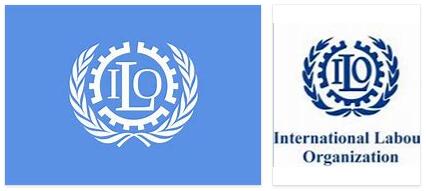
ILO: International Labour Organization
According to AbbreviationFinder.org, International Labour Organization is abbreviated as ILO which is the world institution organized for peace and social development, responsible for the elaboration and supervision of International Labor Standards. It is the only United Nations agency of a “tripartite” nature since representatives of governments, employers and workers participate together in the development of its policies and programs as well as the promotion of decent work for all. This unique way of reaching agreements gives the ILO an advantage by incorporating “real world” knowledge about employment and work.
Historical background
The productive processes unleashed from the industrial revolution were creating the economic base of the industrialized countries today. At that time economic thought was dominated by classics such as Adam Smith in his book Wealth in Nations; Later, other thinkers who shaped the current administrative cycle, such as Farol and Taylor, joined, who were called those of the mechanistic school and saw man as an object and an integral part of the machinery.
Before this deviant in terms of adequate working conditions for workers in the nineteenth century, thinkers such as Karl Marx and Frederick Engels in their communist manifesto, began to set the precedents for world society to wake up as to what was the part inhumane of the industrialization of nations.
Brussels Declaration
Already at the beginning of the 20th century the declarations in Brussels and the founding of an international organization for workers began. After the First World War, the foundations of what is now known as the International Labour Organization ILO began to be laid.
The preamble to the constitutive document of the International Labour Organization, ILO, of April 11, 1919, can be read:
Considering that universal and permanent peace can only be based on social justice; Considering that working conditions exist that entail such a degree of injustice, misery and deprivation for large numbers of human beings, that the discontent caused constitutes a threat to universal peace and harmony; and considering that it is urgent to improve these conditions, for example, regarding regulation of working hours, setting the maximum duration of the day and the work week, hiring of labor, fighting unemployment, guarantee an adequate living wage, worker protection against illnesses, whether professional or not, and against occupational accidents, protection of children, adolescents and women, old-age and invalidity pensions, High Contracting Parties, moved by sentiments of justice and humanity and by the desire to ensure permanent peace in the world, and in order to achieve the objectives set forth in this preamble, agree to the following Constitution of the International Labour Organization. ”
The International Labor Organization was born in 1919, by the society of nations and, upon its disappearance, it subsists as a permanent and specialized body of the United Nations.
In 1817 Robert Owen, a Scottish industrialist, imagined international social legislation. Twenty years later, Jerónimo Adolfo Blanqui, a French sociologist, observes that a social reform of the industry in order to operate should have a global reach. In 1847, Daniel Dgrand, a French industrialist, tried to get France to legislate the International Association of Workers – led by Karl Marx and Frederick Engels (1847) -, they launched his famous manifesto “proletarians of all the united countries”. In 1866 the congress of the International Association of Workers recommended an international labor legislation.
In 1901 an international association for the legal protection of workers was founded in Brussels. They adopted two international conventions in 1906. The war from 1914 to 1918, interrupted the activity of the association.
Objectives
The XXVI meeting of the International Labour Conference held in Philadelphia on May 10, 1944, adopted a declaration for the aims and objectives of said international organization; which are none other than human well-being and social justice. The Philadelphia declaration considers that fundamentally that:
- work is not a commodity
- freedom of expression and succession is essential for progress
- poverty anywhere is a danger to prosperity for all.
- the struggle must be pursued with unceasing energy within each nation and through an international effort.
- universal and permanent peace can only be about social justice.
- All human beings without distinction of race, creed or sex have the right to pursue their material well-being and spiritual development in conditions of freedom and dignity of security and equal opportunities.
- It is the only obligation of her (ILO) to comment among all the nations of the world on programs that allow:
a) to achieve full employment and a rise in the standard of living.
b) employ workers in occupations in which they can contribute the most to the common welfare.
c) to grant as a means of achieving opportunities for professional training, the transfer of workers, including the migration of labor and settlers.
d) adopt in matters of salary and earnings and hours and others a minimum living wage for all those who have a job and need this kind of protection.
e) achieve effective recognition of the right to collective bargaining, the cooperation of employers and workers to improve production and worker collaboration.
f) extend social security measures to guarantee basic income to those who need it and provide full medical assistance.
g) adequately protect the life and health of workers in all occupations.
h) protect childhood and motherhood.
i) provide adequate food, shelter, recreation and culture.
j) guarantee equal educational and professional opportunities.